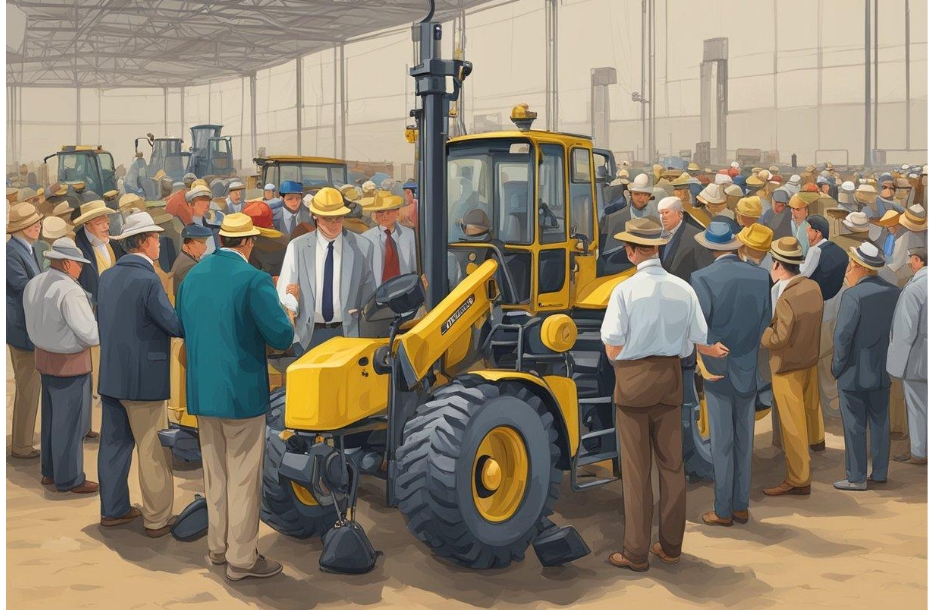Machinery auctions are events that allow buyers and sellers to come together and trade used or new machinery. These auctions can be an excellent way for businesses to acquire the equipment they need at a lower cost than buying new. Machinery auction can also be a great way for sellers to get rid of equipment they no longer need or use.
One of the main benefits of machinery auctions is that they offer a wide variety of equipment for buyers to choose from. This can include everything from small tools to large industrial machinery. Buyers can often find equipment that is hard to find elsewhere, or that they may not have even known was available. Additionally, auctions can provide an opportunity for buyers to purchase equipment at a lower cost than they would be able to find elsewhere.
Understanding Machinery Auctions
Machinery auctions provide a platform for buyers and sellers to trade machinery and equipment. These auctions are a popular way for businesses to acquire machinery and equipment at a competitive price. Understanding the different types of machinery auctions, the auction process, and key terms and conditions can help buyers and sellers make informed decisions.
Types of Machinery Auctions
There are different types of machinery auctions, each with its own unique characteristics. The most common types of machinery auctions are:
- Online Auctions: These auctions are conducted over the internet, allowing buyers and sellers to participate from anywhere in the world.
- Live Auctions: These auctions are conducted in person, with buyers and sellers physically present at the auction location.
- Timed Auctions: These auctions have a set start and end time, with buyers placing bids within the specified time frame.
The Auction Process
The auction process typically involves the following steps:
- Registration: Buyers must register to participate in the auction and receive a bidder number.
- Inspection: Buyers can inspect the machinery and equipment before the auction begins.
- Bidding: Buyers place bids on the machinery and equipment.
- Payment: The winning bidder must make payment for the machinery and equipment within a specified time frame.
- Collection: The buyer must collect the machinery and equipment from the auction location within a specified time frame.
Key Terms and Conditions
There are several key terms and conditions that buyers and sellers should be aware of when participating in a machinery auction. These include:
- Reserve Price: The minimum price that the seller is willing to accept for the machinery and equipment.
- Buyer’s Premium: An additional fee charged to the winning bidder on top of the hammer price.
- Inspection Period: The time frame during which buyers can inspect the machinery and equipment before the auction begins.
- As-Is Condition: Machinery and equipment are sold in their current condition, with no guarantee or warranty provided by the seller.
In conclusion, understanding the different types of machinery auctions, the auction process, and key terms and conditions can help buyers and sellers make informed decisions and achieve a successful outcome.
Participating in Machinery Auctions
Machinery auctions are a great way to acquire used equipment at a reasonable price. However, participating in these auctions can be a daunting task, especially for first-time buyers. This section provides some tips and strategies to help buyers navigate the auction process.
Pre-Auction Preparation
Before attending an auction, it is essential to research the equipment you are interested in purchasing. This includes identifying the make, model, and year of the equipment, as well as its condition and market value. It is also important to inspect the equipment thoroughly to identify any defects or damage.
Buyers should also set a budget for the equipment they wish to purchase. This helps to avoid overspending and ensures that the equipment is purchased at a reasonable price.
Bidding Strategies
When it comes to bidding, there are several strategies that buyers can employ. One of the most common strategies is to start with a low bid and gradually increase it until the bidding reaches the maximum price the buyer is willing to pay. Another strategy is to wait until the end of the auction and make a final bid just before the auction closes.
It is important to remain calm and composed during the bidding process. It is easy to get caught up in the excitement of the auction and overbid. Buyers should also be aware of their competition and avoid bidding against themselves.
Post-Auction Considerations
After the auction, the buyer should arrange for the transportation of the equipment to their location. It is also important to inspect the equipment again to ensure that it is in the same condition as when it was purchased.
Buyers should also be aware of any warranties or guarantees that come with the equipment. Some auctions offer limited warranties or guarantees, while others do not. It is important to read the auction terms and conditions carefully to understand the warranty or guarantee policy.
In conclusion, participating in machinery auctions can be a great way to acquire used equipment at a reasonable price. By following these tips and strategies, buyers can navigate the auction process with confidence and make informed purchasing decisions.
